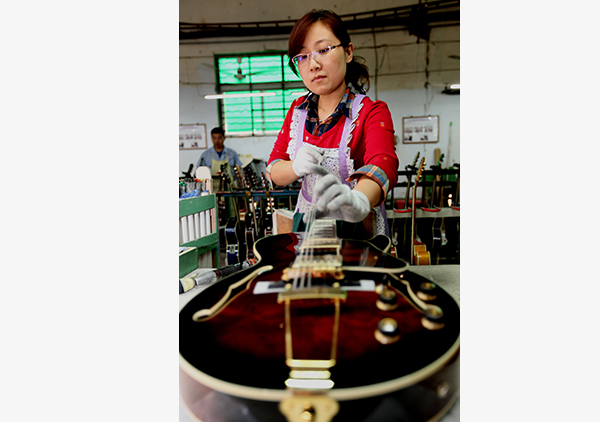Guitar makers predict string of successes
|
A worker processes boards for guitars at a musical instrument company in Huizhou, Guangdong province. The city has more than 200 guitar-related businesses, which own more than 120 brands and produce more than 60 percent of China's guitars. [Photo/China Daily] |
"At the time, mainland companies made guitars, mostly by copying foreign items either in design and technology," said Danny Tsai, general manager of World Sound Music.
Tsai's father, from Taiwan province, set up the guitar manufacturing company in 1991 in Huiyang, a district of Huizhou in Guangdong province, after ending cooperation with a Guangzhou-based State-owned guitar company.
"Since then, a growing number guitar companies from Taiwan as well as South Korea have moved part of their processing businesses to the Pearl River Delta, thus bringing in technologies to the Chinese mainland," said Tsai.
With more overseas investment being introduced to the district, Huiyang, with a population of 615,000 people, has now developed more than 200 guitar-related businesses, producing more than 60 percent of China's guitars.
"My father invested in the company here, because of lower production and labor costs in the 1990s. But we are facing great pressure as both production and labor costs have increased dramatically and foreign demand has decreased significantly," said Tsai.
Like Tsai's company, a growing number of local guitar manufacturers have been struggling to make their business growth sustainable as overseas demand is down and domestic labor and production costs are up.
In the first few years since its establishment, Tsai's company was mainly engaged in processing products for overseas branded guitar groups.
"We realized that we should not simply be a processor for overseas guitar companies. Development of our own brands has been a priority," said Tsai.
The company started investing in building its own brand, J&D Guitars, in the past decade.
"The rising labor and production costs in the Pearl River Delta have made us less profitable. We need to build our own brands for sustainable development," said Tsai.
The company's branded guitars now enjoy hot sales in the domestic and overseas markets, including the United States, Europe and Brazil, according to Tsai.
 |
|
A technician fixes strings to a guitar at a musical instrument factory in Zaozhuang, Shandong province. [Photo/China Daily] |
"Building brands would help introduce more industrial technology talent," said Tsai.
The introduction of advanced automated equipment also plays a vital role in the growth of the business.
"No more will we be simply a traditional processor, that focuses on mass production by employing large number of workers in production lines," said Tsai.
In the past, more than 600 workers were needed in a single production line. "After the introduction of smart equipment, we need only half of the workers in a single processing line. Most importantly, efficiency has been greatly increased," said Tsai.
The company is now able to produce 15,000 electric guitars, 13,000 acoustic guitars and 20,000 ukuleles each month.
"We also give priority to the domestic market, by promoting our products on e-commerce platforms," said Tsai.
Huizhou Tom Music Instrument Co, a company engaged in the design, production and sales of ukuleles, known as the Hawaiian guitars, also attaches importance to the domestic market in terms of growing demand.
"We have shifted focus to the growing domestic market since 2013, where the ukulele has become more popular," said Xie Baojian, general manager of Huizhou Tom Music Instrument.
The company was expected to produce more than 140,000 ukuleles in 2016, with sales increasing more than 30 percent year-on-year.
According to Xie, sales on top Chinese e-commerce platforms such as JD and Tmall now account for almost half of the company's total sales.
Building brands, upgrading processing facilities and promoting products on the domestic market have helped encourage local guitar manufacturers to attach more importance to product quality, according to Yan Wei, secretary-general of the Huiyang Guitar Industrial Association.
"Only through improving quality can local guitar manufacturers make sustainable development," said Yan.
Usually, manufacture of a guitar is started only after the raw wood for the body and neck have been air-dried naturally for roughly six months, with an extra month of artificial drying.
"After more than 20 years of development, we now have a healthy guitar manufacturing industry covering from raw materials, accessories and processing lines to sales," said Yan.









